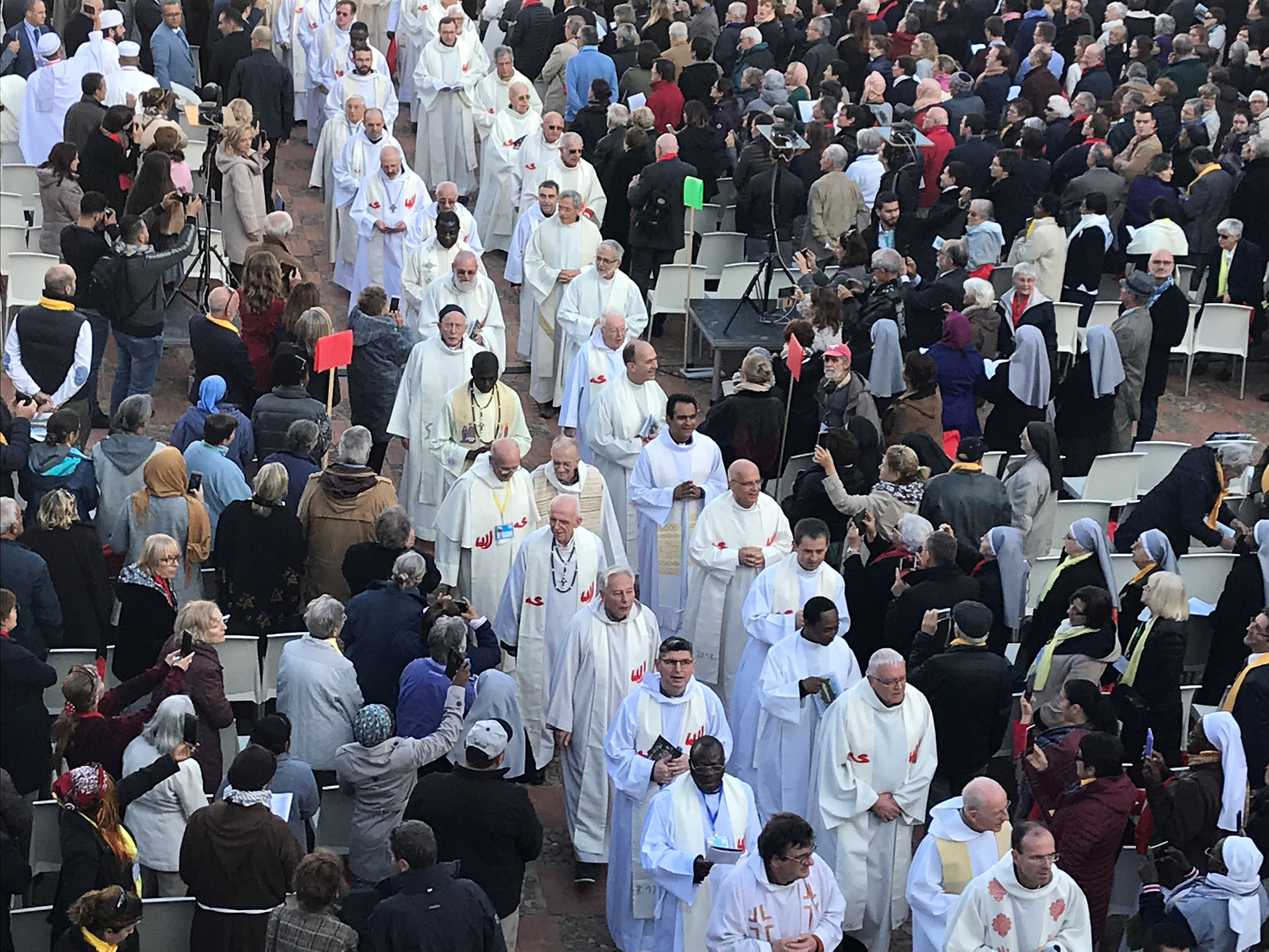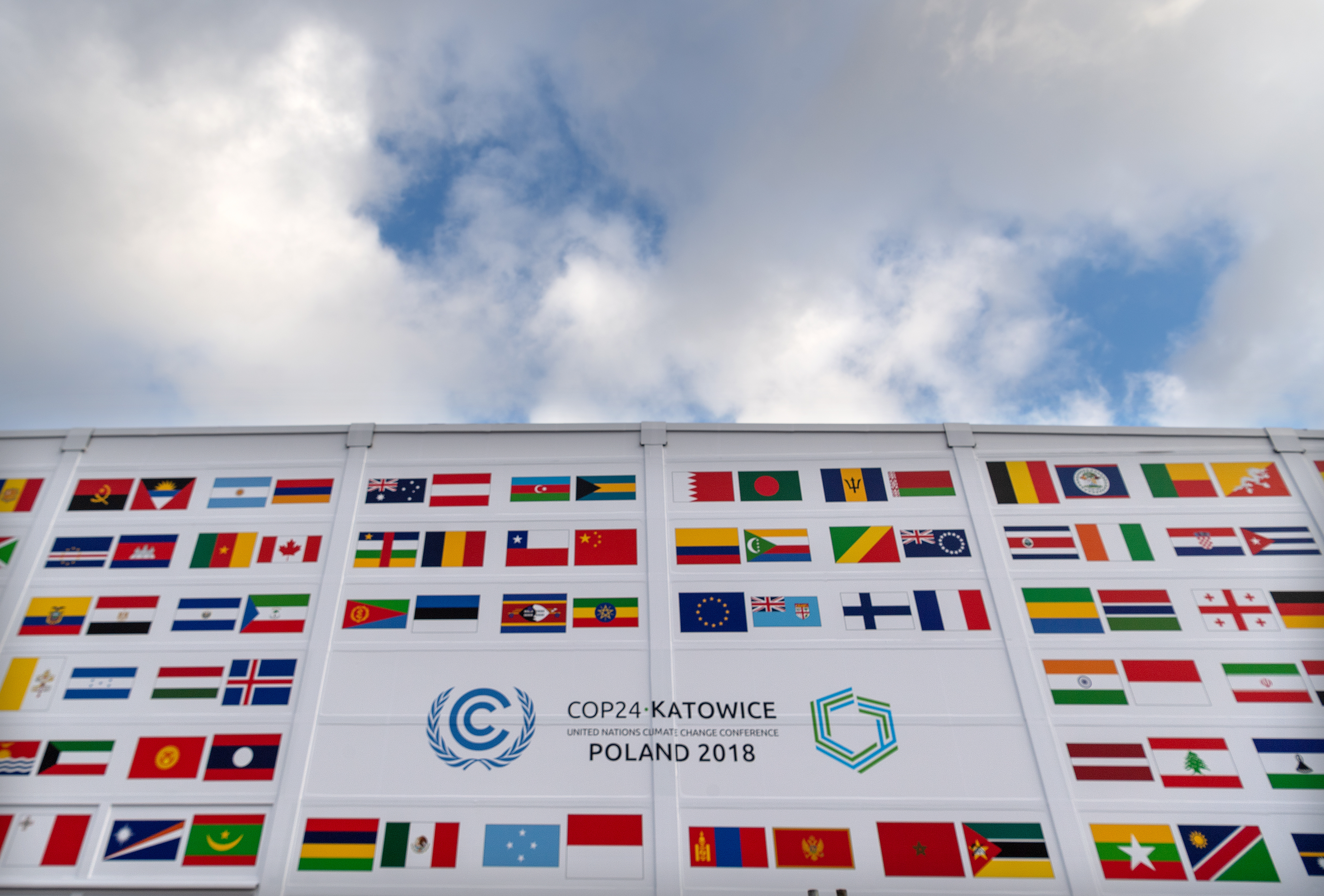A strong faith-based presence at last Saturday’s climate march in Katowice, Poland, was followed on the Sunday by a service at Christ the King Cathedral in Katowice celebrated by Archbishop Wiktor Pawel Skworc of Katowice.
One campaigner present reflected that, “in a city literally built on coal, in a cathedral built from the income of coal, the banners were blessed declaring the end of coal”. Archbishop Skworc said, "hope encourages us to recognise that there is always a way out, that we can always change course, that we can always do something to solve problems". The same day prayers for the COP24 climate talks were said in Poland’s 10,000 Catholic parishes.
The Global Catholic Climate Coalition, Caritas Internationalis, Catholic religious and development agencies, including a busload of CAFOD campaigners, walked in the climate march. A delegate from Marshall Islands told the CAFOD campaigners, "Coming out of negotiations frustrated it really helped to see all the marchers who had travelled to be in Katowice to support us; you’re great, please go back and continue your work". They described feeling “a great sense of hope” and then joined a gathering organised by the unbrella of development agencies from Europe and North America - CIDSE. Church action against investing in fossil fuels and destructive mining was discussed, along with examples of “ecological conversion”. Jack Edwards described a “fantastic day campaigning” which included aLaudato Si’ meeting hosted by Caritas Poland. Speakers included Yeb Sano from the Philippines who had walked from Rome to Katowice as part of the Climate Pilgrimage. He was once lead negotiator for the Philippines at past COP meetings and now advises Philippine Cardinal Tagle on environmental matters.
Earlier in the week Vatican Secretary of State, Cardinal Pietro Parolin, addressed COP24 in Katowice, urging the achievement of the Paris Agreement goals of 2015. The Intergovernmental Panel on Climate Change (IPCC) Special Report released in October, he said, indicates that a “collective response” is needed in order to “work together to build our common home”. Christian Aid expressed disappointment a few days later when the US, Saudi Arabia, Russia and Kuwait blocked the other 193 assembled countries from 'welcoming' the report, even though it had been requested by COP21 in Paris in 2015. Tensions were underlined this week as ministers arrived in Katowice for the final stretch of the talks, which concluded on 14 December.
Many church people felt it unfortunate that the media set France’s fuel tax protests as a climate action versus the people. They followed President Emmanuel Macron’s attempts to increase the green tax on fuel. “Recent events show that a large part of our people face major suffering that produces anger when they don’t feel they’re heard and frustration at what can be taken for arrogance,” Archbishop Michel Aupetit of Paris explained last week. Many feel the French government must establish climate protection policies that reduce inequality, rather than deepen it. This could include policies such as subsidies to enable people to switch to clean energy sources rather than punishing them for failing to do so. It would mean putting the burden on fossil fuel corporations rather than on consumers, particularly those with a low income. “I urge all sides to hold a genuine dialogue where each one agrees to leave behind their fixed positions and come to a real assessment of a harmful situation and humbly finds ways to rebuild a fraternal society together,” Archbishop Aupetit said.
Caritas Australia has called on the Australian Government to make climate change a priority through domestic emissions policies and international leadership, particularly focusing on Pacific neighbours already suffering the effects of rising sea levels.
As world leaders gathered in the Polish city of Katowice for the annual UN Climate Conference, the Director of Caritas Tonga, Ms Amelia Ma’afu, said that Pacific countries were already experiencing the impacts of climate change with unpredictable weather patterns and rising sea levels affecting millions of people.
“In the Pacific, climate change is here,” she said. “It is a question of us losing our home, our values and our lands... a number of our countries are already facing mass migration due to the islands going underwater.
“As our islands go underwater, so too do our connections to the land and our practices. All of our identity is in the land and the sea and it’s the sea that actually provides a common home for Oceania, so we really need the assistance of bigger, more industrialised countries.”
Last month, Caritas Australia released its fifth state of the environment for Oceania report entitled Waters of Life, Oceans for Mercy.
The report, which was produced in collaboration with Caritas Australia’s sister agencies in New Zealand, Tonga, Samoa and Papua New Guinea, focused on environmental issues affecting the lives of peoples in the South Pacific, including coastal erosion/sea level rises, food and water, extreme weather events, offshore mining and drilling, and climate finance.



 Loading ...
Loading ...